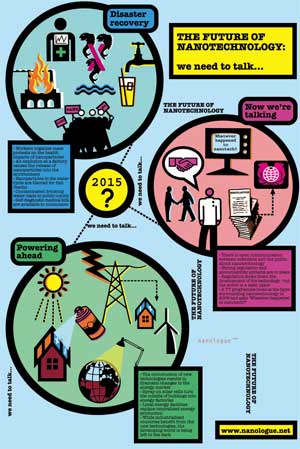| Posted: November 15, 2006 |
The future of nanotechnology - we need to talk |
|
(Nanowerk News) A new report says we need to talk now about nanotechnology and what we want from it if we are going to avoid public backlash.
|
|
Riots on the street, polluted drinking water and mass fish deaths? Or a source of carbon free energy, enabling the EU to meet its Kyoto targets whilst powering our homes and business?
|
|
These are just some of the features of scenarios developed through the Nanologue project, a 21-month EU funded project looking at the social, ethical and legal implications of nanotechnology.
|
|
Speaking about the project, Volker Türk, Project Co-ordinator from the Wuppertal Institute says “Results from the Nanologue project show that we have a choice in how technology develops – but the choices we make now will have considerable consequences for the future. During the past 21 months, Nanologue has raised a lot of interest among experts as well as civil society actors. We have helped to prepare the ground to enhance the dialogue on ethical, legal and social aspects of nanotechnologies. The scenarios, tools and practical project results will facilitate to translate the ongoing discussion into action.”
|
 |
|
On of the project’s main results is the report "The future of nanotechnology: We need to talk". It consists of three scenarios of how nanotechnology will have developed by 2015:
|
|
In the first scenario, Disaster Recovery, a lack of regulation results in a major accident. Public concern about nanotechnology is high and technology development is slow and cautious.
|
|
In the second scenarios, Now We’re Talking, strong regulation and accountability systems are in place. The technology has been shaped by societal needs and strong health and safety concerns.
|
|
The last scenario, Powering Ahead, entails scientific progress which occurs faster than expected. Nanotechnology is making a real impact, particularly in energy conversion and storage.
|
|
The scenarios were developed through consultation with scientists and other experts in the field of nanotechnology and should assist people interested in nanotechnology to think about its place in society in a structured way.
|
|
“It’s important that we learn the lessons from the introduction of GM,” says Hugh Knowles, sustainability advisor at Forum for the Future and one of the authors of the report.
|
|
“In that instance there was a total lack of forward thinking while the science was being developed and people weren’t consulted on the issues that really mattered.”
|
|
At the relatively early stage of the development of nanotechnology, there is still the opportunity to put systems in place that maximise the benefits of nano-related products and minimise the risks of manufacturing, using and disposing of them.
|
|
“But such systems must be developed through informed dialogue involving the key stakeholders” believes Hans Kastenholz of EMPA.
|
|
The report is just one of the deliverables from the Nanologue project. Another is a web-based tool - the NanoMeter - that allows researchers and product developers to understand the societal impacts of their applications during product research and development in a quick and easy way.
|
|
“Offering the most relevant societal implications identified during the Nanologue project the NanoMeter serves as a useful starting point to guide the internal discussion during the development phase of new products and technologies” explains Holger Wallbaum of triple innova.
|
|
“Both tools – the Nanotech 2015 scenarios and the Nanometer – can be helpful guides to a sustainable and successful future of nanotechnology”, adds Volker Türk.
The report and the NanoMeter can be found at www.nanologue.net.
|

